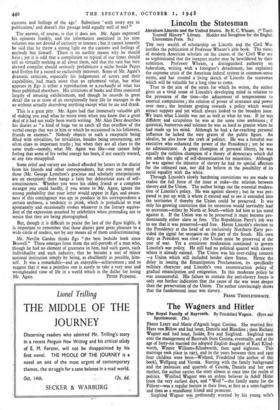Lincoln the Statesman
THE very wealth of scholarship on Lincoln and the Civil War justifies the publication of Professor Wheare's able book. The views of modern American scholars on the causes of the Civil War are so sophisticated that the inexpert reader may be bewildered by their subtleties. Professor Wheare, a distinguished authority on federalism, writing with a foreigner's detachment, has explained the supreme crisis of the American federal system in common-sense terms, and has created a living sketch of Lincoln the statesman which will be valuable for a long time to come.
True to the aim of the series for which he writes, the author gives us a vivid sense of Lincoln's developing mind in relation to the pressures of the time—the adjustment of temperament to external compulsions ; the relation of power of utterance and power over men ; the hesitant groping towards a policy which would attract support and yet which always looked to the broadest issue. We learn what Lincoln was not as well as what he was. If he was diffident and scrupulous he was at the same time ambitious ; if quizzical, humorous.and-tolerant he was as hard as granite when he had made up his mind. Although he had a far-reaching personal influence he lacked the easy graces of the public figure. An idealist, he also knew the craft of politics. He was a forceful war executive who enhanced the power of the Presidency ; yet he was no administrator. A great champion of personal liberty, he was equally the ruthless champion of a theory of democracy which -did not admit the right of self-determination for minorities. Although he was against the injustice of slavery he had no special affection for the coloured race, nor did he believe in the possibility of its social equality with the white.
Through Lincoln's slowly hardening convictions we are made to realise the full force of the issue at stake—the relation between slavery and the Union. The author brings out the essential modera- tion of Lincoln's policy. He was against slavery ; but he was pre- pared to put up with it where it existed and to see it extended into the territories if thereby the Union could be preserved. It was only his growing conviction that its extension would inevitably lead to secession—either by North or. South—which led him to his stand against it. If the Union was to be preserved it must become pre- dominantly either slave or free. The Republican Party's job was to see that it was preserved—and free. Hence Lincoln's election to the Presidency at the head of an exclusively Northern Warty pro- vided the signal for secession•on the part of the South. His own duty as President was clear ; the Union must be preserved at the cost of war. Yet a consistent moderation continued to govern Lincoln's war policy. He still had no political quarrel with slavery where it already existed. The Union was his over-riding concern —a Union which still included border slave States. Hence the delay in issuing the Emancipation Proclamation, its specifically military character and Lincoln's own reconstruction policy of gradual emancipation and emigration. In this moderate policy he was unsuccessful. His failure to contain the anti-slavery forces is only one further indication that the cause of the war went deeper than the preservation of the Union. The author convincingly shows that the fundamental issue was slavery.
FRANK THISTLETHWAITE.


































 Previous page
Previous page